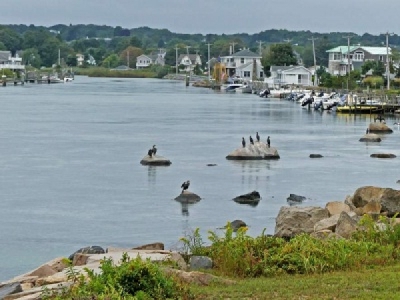
Posted on April 6, 2020
WESTERLY — The Town Council is looking for what one member calls “ironclad” assurance that a proposed expenditure of about $1 million will unlock about $5.2 million in federal funds for two projects aimed at improving water quality and habitats in Winnapaug Pond.
On Monday, the council will consider spending the $1 million needed as a non-federal match for a $2.7 million U.S. Army Corps of Engineers eel grass restoration project that calls for dredging a portion of the pond to remove an estimated 75,000 cubic yards of sediment.
The same expenditure of town funds would be used as a match for a $2.4 million U.S. Department of Agriculture Natural Resources Conservation Services demonstration project aimed at reducing nutrient loads that have a detrimental effect on the pond.
Town officials say efforts to find money for the match at the state level have been fruitless.
The council previously approved spending $119,000 of town funds to be used toward design of the dredging project.
Councilor Caswell Cooke Jr., during a council meeting on Wednesday, noted the town has been trying to initiate a major dredge project at the pond for decades. A dredge of the pond in 2018 was limited to a small area because of permitting problems the town encountered. Last summer the pond was closed for a few days in late July because of high bacteria counts. Parts of the Misquamicut beaches were also closed and some businesses were forced to close. The health of the pond plays a critical role in the town’s tourism economy, Cooke said.
“If we don’t dredge, we’re sealing our fate down at the beach,” Cooke said.
Councilor Brian McCuin said he was worried the town would spend money on the project only to find the federal funds were no longer available. He noted the extraordinary financial stimulus package approved by Congress in response to the COVID-19 pandemic and questioned whether federal funds would be made available for projects such as the proposed dredge of the pond.
Town Manager J. Mark Rooney said he hoped to provide the council with written confirmation of funding availability from the U.S. Army Corps and U.S. Sen. Sheldon Whitehouse’s office for the Town Council on Monday. Additionally, Rooney confirmed that town funds would not be expended unless it was clear the dredge project was going to occur and that federal funds were available.
Rooney has proposed borrowing funds for the non-federal match from the state Infrastructure Bank. The town could pay the funds back over 10 years, according to his proposed 2020-21 budget.
Residents and environmental groups are calling on the council to approve the funding.
Jeff Gardner, who leases a 3-acre section of the pond for his Watch Hill Oyster company, said the dredge would improve the pond and have a positive ripple effect.
“It will tremendously improve the health of the pond which would improve tourism,” Gardner said.
Gina Fuller, a resident and district manager of the Southern Rhode Island Conservation District, said the dredge would help “restore vital aquatic habitats.” The pond, she said, contributes to the state’s economy and provides food security.
The district partnered with the town and several state agencies in applying for U.S. Department of Agriculture Natural Resources Conservation Services grant for the watershed project.
The watershed initiative would involve working with landowners to build partnerships and install conservation practices to reduce nutrient loads from entering the pond and affecting oxygen levels and causing other problems in the pond.
The U.S. Army Corps completed survey work at the pond last week, according to Lisa Pellegrini, director of the municipal Development Services Department. The project is expected to go out to bid in time for the dredge to occur between October and January, Pellegrini said.
“We don’t want to end up delaying this because we can’t get the match … next year they may not have the money for construction they have the money this year,” Pellegrini told the council.
Art Ganz, president of the Salt Ponds Coalition, in a letter to the Town Council, said dredging the pond would improve its overall ecology. According to Ganz, there is a low diversity of species in the pond, eel grass is “non-existent,” the eastern half of the pond is full of sand and the western side contains poorly oxygenated organic mud. Dredging the pond would allow for increased tidal flushing and creation of sediment basin would improve water quality, reduce sedimentation and spur eel grass growth.
Eel grass is a food source for waterfowl and is a foraging area for crabs and plays a role in keeping water clear. Scientists believe excess nutrients cause a decline in eel grass beds.
Pellegrini noted that dredging the pond emerged as a top priority during a resiliency workshop in August.
Source: thewesterlysun





